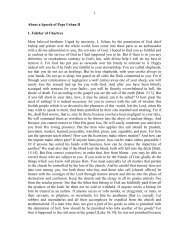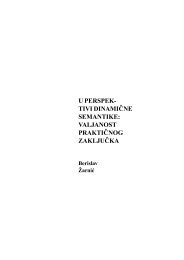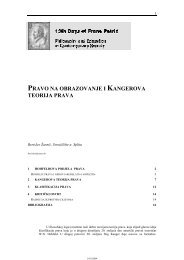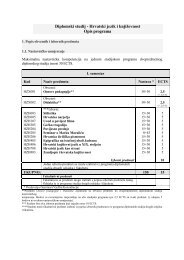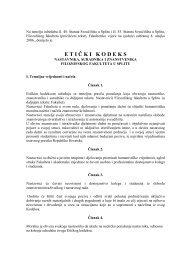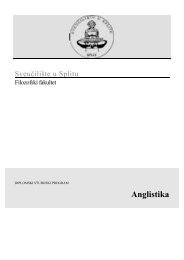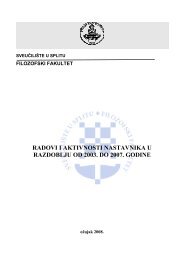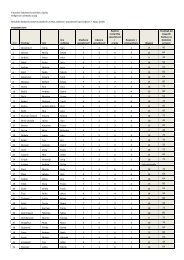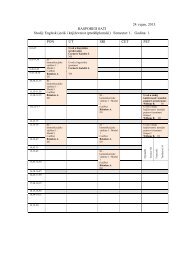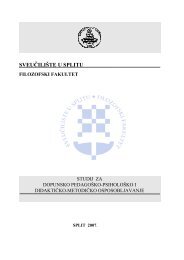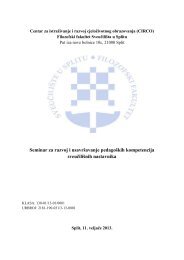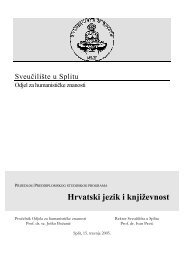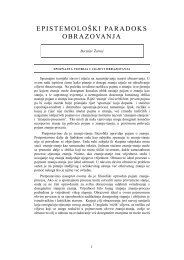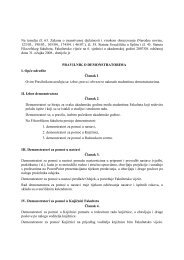English Studies
English Studies
English Studies
Create successful ePaper yourself
Turn your PDF publications into a flip-book with our unique Google optimized e-Paper software.
G R A D U A T E D E G R E E P R O G R A M M E : E N G L I S H S T U D I E S<br />
literary texts of several genres (novelistic prose; drama; poetry and essay)<br />
from <strong>English</strong> into Croatian.<br />
Prerequisites Competences and skills acquired upon the successful completion of Literary<br />
translation – Module 1.<br />
Course contents Introduction to the translation of prose texts containing dialect and slang.<br />
Practical work: translation of such texts (in pairs or smaller groups; as<br />
individual assignment).<br />
Introduction to the translation of drama. Practical work: translation of a<br />
selected play (one act).<br />
Introduction to the translation of poetry. Practical work: translation of<br />
Recommended<br />
reading<br />
Supplementary<br />
reading<br />
Teaching<br />
methods<br />
Assessment<br />
methods<br />
selected poems (in pairs; as individual assignment).<br />
Bassnett, S. (1991). Translation <strong>Studies</strong>, Revised Edition. London:<br />
Routledge.<br />
Bonačić, M. (1999). Tekst, diskurs, prijevod. Split: Književni krug.<br />
Bratulić, J. (ed.) (1990). Sveti Jerolim, Izabrane poslanice. Split: Književni<br />
krug.<br />
Newmark, P. (1988). A Textbook of Translation. London: Prentice Hall<br />
International.<br />
Evan-Zohar, I. (1990). Polysystem <strong>Studies</strong>. Special issue of Poetics Today<br />
11.1.<br />
Popovic, A. (1976). Dictionary for the Analysis of Literary Translation.<br />
Edmonton: Department of Comparative Literature, University of Alberta.<br />
Teacher-generated materials dealing with the quality of published<br />
translations of eminent Croatian translators as well as with the evaluation<br />
of a number of different translations of the same text.<br />
1. Short introductory lectures (traditional) on the history and theory of<br />
literary translation with active student participation in the ensuing<br />
discussion about the topic;<br />
2. Introductory practical guidelines for independent translation work on a<br />
shorter literary text (progression from simpler to more complex texts; from<br />
one genre to another);<br />
3. Seminars: individual and group analysis and assessment of translation<br />
assignments (independent work) with active student participation;<br />
4. Workshops: translation of the assigned literary text in pairs or smaller<br />
groups with teacher assistance and ensuing group discussion;<br />
5. Tutorials: teacher counselling given to individual students for finding<br />
solutions to problems arising from the assigned or freely chosen translation<br />
texts (students’ choice);<br />
6. Independent work: a) assigned texts for translation; b) freely chosen texts<br />
for translation (students’ choice).<br />
Active student participation is encouraged in all areas of work and study.<br />
The assessment of student knowledge and performance will be based on the<br />
following:<br />
1. Continuous assessment (independent homework translation tasks,<br />
seminar papers and workshop achievements; portfolio).<br />
2. Exam: written, i.e. presentation of the final seminar translation text.<br />
55



